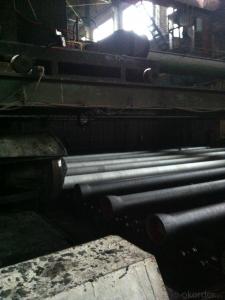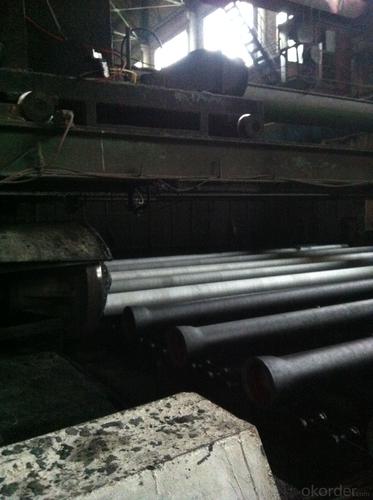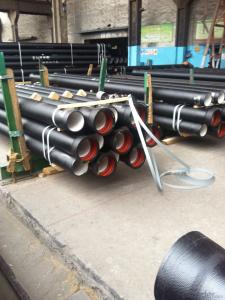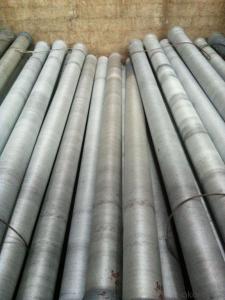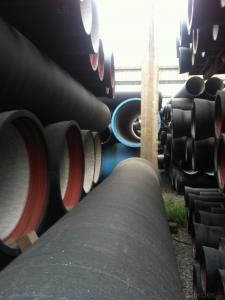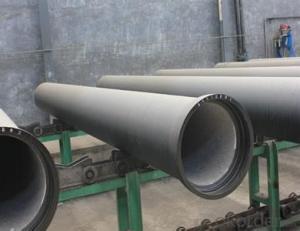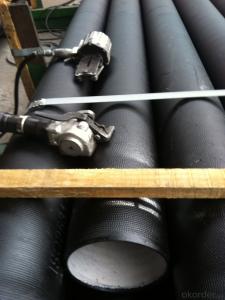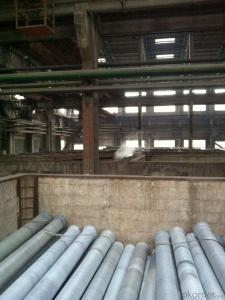DUCTILE IRON PIPE AND PIPE FITTINGS K7 CLASS DN700
- Loading Port:
- Tianjin
- Payment Terms:
- TT OR LC
- Min Order Qty:
- 32 pc
- Supply Capability:
- 3000 pc/month
OKorder Service Pledge
OKorder Financial Service
You Might Also Like
· Material : Ductile Cast Iron
· Size Range : DN 80mm to DN 2000mm
· Unit Effective Length : 6m or 5.7m
· Manufacture Standard: ISO 2531:1998/ EN 545:2006/EN 598:2007
· Annual capacity : 200,000 tons
· Coating Exterior: Zinc 130g/m2 according to ISO 8179-1 and bitumen coating 70 microns.
· Cement Interior: Portland Cement/ High Alumina Cement/ Sulphate Resisting Cement Lining according to ISO 4179
· Special requirements on external coating and internal lining can be applied
· We also provide accessories such as SBR/EPDM rubber gaskets, lubricant paste, pipe caps, PE sleeves, etc.
Additional Parts:
Each pipe is strictly inspected according to related standard to ensure permanently high performance.
Easy Installation at site and service free for life
Long Service Lifespan
Quotation will arrive you within 24hours once we get your inquiry.
We guarantee offering you a competitive price.
A copy of original inspection reports of pipes will be offered after shipment.
Photos of loading process will be sent to the customer after shipment effect.
We will follow-up the delivery progress after shipment effect and update to the customer on weekly basis.
- Q: Are ductile iron pipes suitable for industrial water systems?
- Yes, ductile iron pipes are suitable for industrial water systems. They possess excellent strength, durability, and corrosion resistance, making them ideal for transporting water in industrial settings. Additionally, their ductility allows them to withstand high pressure and accommodate for ground movement, ensuring long-term reliability in industrial water systems.
- Q: Are ductile iron pipes suitable for power plant applications?
- Yes, ductile iron pipes are suitable for power plant applications. Ductile iron pipes are known for their high strength and durability, making them capable of withstanding the high-pressure and high-temperature conditions typically found in power plants. Additionally, ductile iron pipes have excellent corrosion resistance, which is crucial in power plant environments where water and chemicals are often present.
- Q: What are the different pressure classes available for ductile iron pipe?
- The different pressure classes available for ductile iron pipe include Class 100, Class 150, Class 200, Class 250, Class 300, Class 350, and Class 400.
- Q: Can ductile iron pipes be used for water main extensions?
- Yes, ductile iron pipes can be used for water main extensions. Ductile iron pipes have excellent strength and durability, making them suitable for carrying water over long distances and withstanding high pressure. They are corrosion resistant and have a long lifespan, making them a reliable choice for water main extensions.
- Q: How are ductile iron pipes tested for quality?
- Ductile iron pipes are tested for quality through various methods, including hydrostatic pressure testing, dimensional inspection, and mechanical properties testing. Hydrostatic pressure testing involves subjecting the pipes to water pressure to ensure they can withstand the intended operating conditions without any leakage or failure. Dimensional inspection assesses the pipes' dimensions, such as diameter, wall thickness, and length, to ensure they meet the specified standards. Mechanical properties testing evaluates the pipes' tensile strength, yield strength, and elongation to ensure they possess the necessary strength and flexibility. Overall, these rigorous testing procedures help ensure the high quality and reliability of ductile iron pipes.
- Q: What are the different types of restrained joints for ductile iron pipe?
- Some of the different types of restrained joints for ductile iron pipe include mechanical joints, push-on joints, and restrained push-on joints. Mechanical joints use bolts and gaskets to create a tight seal, while push-on joints rely on a rubber gasket to provide a secure connection. Restrained push-on joints incorporate additional features such as external restraints or wedges to prevent pipe movement.
- Q: Are ductile iron pipes suitable for underground parking structures?
- Yes, ductile iron pipes are suitable for underground parking structures. Ductile iron pipes are known for their strength and durability, making them an ideal choice for underground applications where they may be subjected to heavy loads or potential impacts. Additionally, ductile iron pipes have excellent corrosion resistance, which is crucial in underground environments where they may be exposed to moisture and other corrosive elements. The high tensile strength and flexibility of ductile iron pipes also allow them to withstand ground movements and settle without cracking or breaking, further enhancing their suitability for underground parking structures. Overall, ductile iron pipes provide a reliable and long-lasting solution for the drainage and water supply needs of underground parking facilities.
- Q: Can centrifugal cast iron pipe be galvanized or coated with asphalt which is good for corrosion prevention?
- By spraying zinc and epoxy coal tar coating of ductile iron pipe wall (or epoxy resin paint, polyurethane, etc.) wall using Portland cement (or epoxy powder, epoxy, polyurethane, ceramics etc.) wall coating can effectively active substances in soil and the formation of an insoluble zinc salt protection tube, the internal coating can inhibit corrosion of pipe body fluid medium.
- Q: How do ductile iron pipes perform in high-temperature steam applications?
- Ductile iron pipes excel in high-temperature steam applications thanks to their remarkable performance. They can withstand elevated temperatures and maintain their structural integrity, making them highly suitable for steam distribution systems. One notable advantage of ductile iron pipes in high-temperature steam applications lies in their exceptional thermal conductivity. This property enables efficient heat transfer, ensuring that the steam is delivered at the desired temperature with minimal loss. Additionally, the high thermal conductivity of ductile iron helps to mitigate the risk of thermal expansion and contraction, which can lead to pipe failure or leakage. Moreover, ductile iron pipes boast a high melting point, typically around 2000°F (1093°C). This resistance to extreme temperatures encountered in steam applications ensures that the pipes remain intact and do not deform, guaranteeing the reliability and longevity of the piping system. Another crucial factor contributing to the performance of ductile iron pipes in high-temperature steam applications is their corrosion resistance. These pipes are usually coated with epoxy or other protective materials to prevent corrosion and maintain their structural integrity, even in aggressive steam environments. This corrosion resistance ensures that the pipes can endure harsh conditions and operate efficiently over an extended period. In conclusion, ductile iron pipes are an ideal choice for high-temperature steam applications due to their excellent thermal conductivity, high melting point, and corrosion resistance. These properties make them a reliable and long-lasting option for steam distribution systems, ensuring the safe and efficient transportation of steam at elevated temperatures.
- Q: How are ductile iron pipes protected against erosion caused by high-velocity flow?
- Ductile iron pipes are protected against erosion caused by high-velocity flow through various methods. One common approach is to apply an internal lining to the pipe, which can be made of materials such as cement mortar or polyethylene. This lining provides a smooth surface that reduces the friction and turbulence of the flowing water, thus minimizing the erosion potential. Additionally, external coatings, such as bitumen or epoxy, can be applied to protect the outer surface of the pipe from erosion caused by external factors like soil movement or abrasive materials. Regular inspection and maintenance of the pipes also play a crucial role in identifying and addressing any erosion-related issues to ensure their long-term durability.
Send your message to us
DUCTILE IRON PIPE AND PIPE FITTINGS K7 CLASS DN700
- Loading Port:
- Tianjin
- Payment Terms:
- TT OR LC
- Min Order Qty:
- 32 pc
- Supply Capability:
- 3000 pc/month
OKorder Service Pledge
OKorder Financial Service
Similar products
Hot products
Hot Searches
Related keywords
